College Admissions
College Admissions
Preparing for College
The Best College for You
What to Study
Applications
Education Options
Education Options
Private Universities
Public & State Universities
Community Colleges
Scholarships
Scholarships
African American Scholarships
Latino Scholarships
Native American Scholarships
Women Scholarships
College Grants
College Grants
Federal Grants
Merit Based Grants
Need Based Grants
Student Loans
Student Loans
Federal Student Loans
State Student Loans
No Co-signer Student Loans
Bad Credit Loans
Student Loan Consolidation
College Survival
College Survival
Financial Aid Tips
The Digital Student Blog
It is deemed to be one of the “most popular courses in Harvard’s history.” And now, thanks to WGBH television and Harvard University, every American has an opportunity to examine the moral and ethical issues that form Michael Sandel’s course “Justice.”
In opening this classroom to the world, Harvard gives us a taste of the future of higher education. With the proper preparation and a gifted-instructor, the course is proof-positive that high quality education can be delivered online.
In fact, one might honestly ask, what is the advantage of actually being seated in the auditorium where Sandel teaches. The incredible numbers of students eliminate any intimacy and any real possibility of discussion within the “classroom setting,” i.e. stadium-style lecture halls.
That said, the critical components of the twelve-part series are the content and the complex moral questions being posed. Addressing the hot topics of our day (affirmative action, same-sex marriage, patriotism and rights), Sandel offers a constant stream of provocative questions that provide for outstanding discussion opportunities.
As but one example of how to use content to drive instruction, in episode 2, How to Measure Pleasure, Sandel offers video clips from three distinct and different elements of the entertainment world: clips from Shakespeare’s Hamlet, the reality show Fear Factor, and The Simpsons.
The course also features opinion polls, pop quizzes, in-depth readings and discussion guides offering two levels of debate, beginner and advanced depending on your current background.
As for one rationale for the online version exceeding the traditional classroom model, online classes now offer literally endless possibilities for rich discussions with viewers from around the world. Not only are such discussions impossible in the auditorium where the class is presented, online discussion forums remove the need for students to gather collectively on a single campus.
The two drawbacks? First, there is that same mentality that features the typical time constraints of all education, materials are being released weekly.
Second, the method for earning those all-important credits that can be collected to earn a college diploma.
But as for the model of what could be, Justice is the real deal!
By all accounts, the job placement data for the Class of 2009 was exceedingly dismal. While everyone is hopeful of a better future and most signs point to an economy on the rebound, career experts insist that the Class of 2010 could well see similar job placement challenges.
The reason is quite simple – it seems that the poor 2009 job placement rates came in great part because a large number of 2008 graduates had been unable to secure a job in their field. Now, the Class of 2010 faces a double whammy, the cascading effect of two consecutive poor placement years.
Therefore, even as the economy turns the corner, next year’s grads will be competing with a number of currently unemployed folks for the few additional jobs that become available.
Becoming a Recession Proof Graduate
Given this sobering scenario, today we turn to Charlie Hoehn, the author of the interesting SlideShare ebook, “Recession Proof Graduate.” A 2008 graduate of Colorado State University, Charlie holds degrees in marketing and media studies.
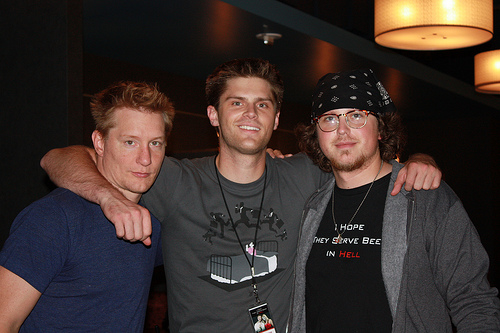 Currently touring the country with Tucker Max during the screening of his new movie: I Hope They Serve Beer in Hell, Charlie continues to work with Ramit Sethi, a partnership that led to Sethi’s recent book becoming a NY Times and Wall Street Journal best-seller, and with Tim Ferriss, author of the NY Times best-seller, The Four-Hour Workweek.
Currently touring the country with Tucker Max during the screening of his new movie: I Hope They Serve Beer in Hell, Charlie continues to work with Ramit Sethi, a partnership that led to Sethi’s recent book becoming a NY Times and Wall Street Journal best-seller, and with Tim Ferriss, author of the NY Times best-seller, The Four-Hour Workweek.
Charlie provides some pretty radical advice in Recession Proof Graduate. After reading his recommendations, we wanted to give Charlie some time to discuss his job search process, particularly his decision to throw out the traditional search model after seeing conventional techniques produce dismal results for him.
In your book, you talk about your initial job search upon graduating and the difficulties you had. At some point you came to the realization that the recession was not the issue, it was your use of conventional job-hunting methods and your expectations related to that search. Which realization came first, the need to change your expectations or your need to try a new search technique?
The need to change my expectations definitely came first. After I got turned away from a company I’d interned with for three months (and they LOVED me, by the way), I kinda knew the odds of me finding a well-paying, fun job were pretty slim. I changed my job hunting tactics later on out of sheer desperation, after trying the traditional methods for a few months and seeing godawful results.
You certainly turn one standard goal of the job search process on its head. Can you explain why the goal for graduates should not be focused so much on making loads of money?
I’m all for making a lot of money, but I knew that I didn’t necessarily deserve a big paycheck right away. I had to earn that right. So I think the goal for graduates should not be to immediately find a high paying gig, but rather to figure out how to maximize their potential future earnings. This can be done by learning in-demand skills, doing free work for specific people, etc. This way, you’re setting yourself up for making more money in the long run, while also making yourself more valuable as an employee and building your network.
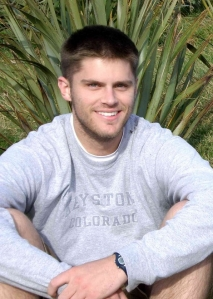 Another reason I don’t think grads should be too focused on money is because it will REALLY force you to figure out what your priorities are. I have a few friends who jumped into industries they don’t like because they were tempted by the promise of $60-80K in the first year on the job. Even I played with the idea of being a landman for an oil and gas company because I would have made $70K straightaway. But I also would have quickly grown to hate my life. And after a certain point, I would have been so emotionally and financially dependent on that big paycheck that there’d be no turning back. It’s far better, I think, to do free work for a few months. You’ll figure out what you truly want to do.
Another reason I don’t think grads should be too focused on money is because it will REALLY force you to figure out what your priorities are. I have a few friends who jumped into industries they don’t like because they were tempted by the promise of $60-80K in the first year on the job. Even I played with the idea of being a landman for an oil and gas company because I would have made $70K straightaway. But I also would have quickly grown to hate my life. And after a certain point, I would have been so emotionally and financially dependent on that big paycheck that there’d be no turning back. It’s far better, I think, to do free work for a few months. You’ll figure out what you truly want to do.
And really, should a student consider throwing away their resume?
Maybe not literally, but I do think resumes suck. Just from an aesthetic standpoint, I think resumes are awful. They all look the same — plain and boring — and when you consider that you’re in a pile with dozens (and sometimes hundreds) of other resumes, you have to realize that it’s nearly impossible to stand out. The average graduate will not have any remarkable credentials under his belt, so how is he going to beat out all these other faceless resumes? He won’t. So I say throw away your resume. A one-page document shouldn’t represent your past, present, and future. A blog or a portfolio are superior alternatives, and they can vividly illustrate a person’s thought process and skills.
The idea of working for free to obtain critical experience and skills isn’t really new is it? Is this not just the concept of an internship? And, didn’t you get the skills you needed in college?
Free work is very different from an internship, as Seth Godin pointed out. Free work allows you to work on your own terms: you get to work with the people you want to, on the projects you want to work on, in the industry you want to work in. The relationships with the people you work for will develop organically, and they won’t look at you as just an intern — they’ll actually want to help you learn and grow.
Did I get the skills I needed while I was in college? Yes and no. Yes, because all of the skills I’m currently hired and paid for were things I taught myself while I was in college. No, because college didn’t really teach me any new skills that employers would want to hire me for. College gave me a degree, a GPA, and four years of fun memories. None of those hold much weight in a recession.
In your ebook you explain that many folks insist that you have this new job search process all wrong – one honest fear of some of the folks I have talked to is that once you work for free that will become the ongoing expectation – how do you respond to folks who raise this concern?
I briefly addressed this at the end of the e-book. It’s all about managing expectations. If you don’t lay down a deadline for when the free work transitions to paid work (or introductions to other people, new opportunities, etc.), then you’re setting yourself up to be taken advantage of. Most people who take you under their wing to do free work will be more than willing to reciprocate and help you out if you do a really great job, but you need to make that clear upfront. I’ve done free work for a bunch of people over the last year and a half. I only felt like I got burned once, and that was when I did work for a struggling entrepreneur who was working on his first startup (which is why I recommend that graduates work for successful entrepreneurs).
I also try to work with people who are dependent on maintaining a strong, healthy personal brand online. I’ve built up enough credibility and have enough followers that it’s a bigger liability for them if they take advantage of me. This is not to say I would ever hold this over their head, or threaten them with it if things started to go poorly. Rather, it’s just to point out that it’s in their best interest to take care of me (which they do).
One key element is the suggestion to seek to do this free work virtually – why is this a point of emphasis in the process?
Doing work virtually really frees you up to work with anyone you want — you’re not limited to whatever local opportunities are available. You can work with people in other states, or other countries. Virtual free work is probably the best dynamic for graduates, because you can take on a bunch of projects all at once and choose which ones you want to continue pursuing. There’s very little risk involved for the employer (no money spent, no time wasted training), and there’s very little risk for the graduate. What’s the employer going to do if you screw up? “Fire” you? Probably not — you’re not eating up their payroll and you’re not using much of their time either. Even if you do end up parting ways, it’s not the end of the world.
You not only talk about the importance of a person’s online presence, you honestly inform folks that your initial online presence did not portray you in a very flattering light. Can you explain to readers what your initial presence looked like and the process you used to bury the negative elements to the Google hinterlands?
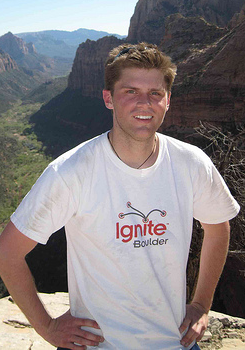 What shows up in Google when you search for someone’s name is a little different from having an online presence. A few years ago, I had a Facebook and LinkedIn account — technically, that’s an online presence. But when you searched for ‘Charlie Hoehn,’ a CollegeHumor video of my friend riding his bike drunkenly down a flight of stairs (and crashing) was one of my top 5 results. Another one of my top results was an online article from CSU’s newspaper where I was quoted talking about abortion. My old Google results didn’t really give any employer much to work with in terms of figuring out what I’m like or whether I’d be worth hiring.
What shows up in Google when you search for someone’s name is a little different from having an online presence. A few years ago, I had a Facebook and LinkedIn account — technically, that’s an online presence. But when you searched for ‘Charlie Hoehn,’ a CollegeHumor video of my friend riding his bike drunkenly down a flight of stairs (and crashing) was one of my top 5 results. Another one of my top results was an online article from CSU’s newspaper where I was quoted talking about abortion. My old Google results didn’t really give any employer much to work with in terms of figuring out what I’m like or whether I’d be worth hiring.
I had to start a blog for the virtual internship I did with Seth Godin (I never planned on having one). Eventually, people started to link to me and actually write about me, for whatever reason. And all of those posts started to accumulate and bury my negative Google results. It wasn’t actually an intentional process to put me in a positive light online — it just sort of happened on its own.
How long did this process actually take?
I’m not entirely sure, but I want to say it was between 2-4 months before I had control of the top 5 search results for my name. It took a few more months to really get a stranglehold on the top 10 results. I have a fairly rare last name, so I’m sure it will take a lot longer for some people.
Your advice about starting a blog to help define your online brand comes with a couple of cautions – talk a little bit about those cautions.
A lot of people, especially graduates, make a huge mistake when they start blogging: they’re honest to a fault. They treat their blog as a personal diary, where they can talk about their alcoholism, or their inability to talk to women, or whatever other shortcomings they have. If you want to do that, go find an anonymous forum or something. Don’t do it on your personal blog if you’re legitimately trying to use it as a tool to get hired. You want to paint an honest yet flattering picture of yourself, so be professional.
 Quality of content is also HUGELY important. If you write up something half-assed and you know it’s not very good, don’t post it. I think it’s more of a liability to have a bad blog than it is to have no blog at all. You can talk your way out of mediocre search results, but if the writing on your blog sucks, you can’t really dig yourself out of that hole.
Quality of content is also HUGELY important. If you write up something half-assed and you know it’s not very good, don’t post it. I think it’s more of a liability to have a bad blog than it is to have no blog at all. You can talk your way out of mediocre search results, but if the writing on your blog sucks, you can’t really dig yourself out of that hole.
Two really key elements of your philosophy are to choose the right person to work for and to choose projects you really care about. Can you talk a little bit about the characteristics you focus in on when deciding which person or industry to target?
I have several questions I ask myself when deciding whether I want to work with a person or not:
• Does this opportunity excite me?
• Is it going to be fun, challenging, and intellectually stimulating? i.e. Will it help me grow as a person?
• Will more opportunities open up to me when this is over?
• Can I learn a new skill set if I work with them?
• How flexible will my schedule be if I take this? This is important, because if it’s a huge time-kill, I won’t take it.
• Is this person a successful entrepreneur? If no, proceed with caution. Entrepreneurs who have never succeeded are a big risk, and are usually too poor to ever pay much. They’re fun to work with, but it’s usually not worth the time.
• How well does it/will it pay?
There aren’t many criteria for deciding which industry to target. Basically, I just go after the ones that look the most fun.
When contacting potential targets, you rightfully note the need to do some intense homework on the target. You then note that that the student should suggest specific examples of free work he/she could do that will have a measurable impact on the targeted business. My fear is that this would come off sounding a bit presumptuous to the recipient?
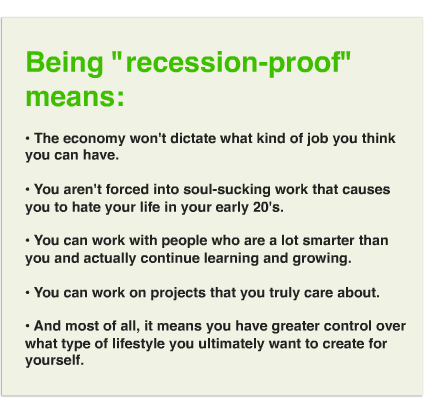 It’s hard to approach an employer with some vague description of what you can do for them or, even worse, saying you’ll help out however you can. It’s too broad and vague, so it’s hard for them to visualize how you’d be an asset. But if you lay out in specific terms how you think you can help them, and give them a few suggestions, it helps them fill in the gaps. You won’t force them to rack their brain on how they can use you. Instead, you’re helping them visualize how you’ll fit into the picture. Trust me, they’ll be very impressed that you brought a list of ways in which you could help.
It’s hard to approach an employer with some vague description of what you can do for them or, even worse, saying you’ll help out however you can. It’s too broad and vague, so it’s hard for them to visualize how you’d be an asset. But if you lay out in specific terms how you think you can help them, and give them a few suggestions, it helps them fill in the gaps. You won’t force them to rack their brain on how they can use you. Instead, you’re helping them visualize how you’ll fit into the picture. Trust me, they’ll be very impressed that you brought a list of ways in which you could help.
Can you give our readers a sense of a how you used this strategy to land some critical first opportunities?
Everyone I’ve approached for work in the last year has hired me because I laid out how I could help them specifically. Ramit Sethi was the first person I used this strategy on, and he eventually introduced me to Tim Ferriss. I gave Tucker specific examples of how I could help him, as well. Giving suggestions shows your initiative, and your willingness to emotionally commit to a job before you even get it. Try it, you’d be surprised at how effective it is.
Photos courtesy of Charlie Hoehn.
So you are at the supermarket. You are standing in the aisle that features a gazillion different types of toilet paper wondering which product you should buy.
If you were home, you could Google-search each brand to see which one might be the most ecologically sound to purchase. Of course, if you were so inclined, you could also whip out your cell phone, get online and start the process right at the store.
But as amazing as Google is as a search engine and as amazing as the world wide web is as a data storage system, the idea of researching which toilet paper is the most ecologically-sound purchase is currently far too cumbersome to enact while standing in the aisle.
However, not too surprisingly, some folks have begun asking, is there a way we could make such information available to the purchaser, a process that might allow us to access the available data via that cell phone without ever taking the device out of our pocket? And could there be a way to transfer the data stored on the web via the cell phone so as to appear on the very package you are considering purchasing?
Sixth Sense
 As far-fetched as that might sound, the idea forms the basis for the work of two cutting edge researchers, Pattie Maes and Pranav Mistry.
As far-fetched as that might sound, the idea forms the basis for the work of two cutting edge researchers, Pattie Maes and Pranav Mistry.
Maes is well known for her contributions related to media work having been a key architect behind the concept called “collaborative filtering” (the principles used to generate music at Pandora.com). An associate professor in MIT’s Program in Media Arts and Sciences, Maes founded and currently directs the Media Lab’s Fluid Interfaces group. Mistry, a PhD student within the Fluid Interfaces Group, is deemed the genius behind this new concept called Sixth Sense.
Combining two electronic devices already readily available to most people, a camera and a cell phone, with two not currently as ‘en vogue,’ a portable projector and a mirror, these researchers have built a prototype device that plugs into the net in an entirely new way. The ingenious, not-so-chic, wearable device truly allows one to rethink the ways in which humans and computers interact.
With Sixth Sense, “the computer is no longer a distinct object, but a source of intelligence that’s embedded in our environment.” Then “by outfitting ourselves with digital accessories,” we are able to “continually learn from (and teach) our surroundings.”
The concept essentially turns your entire world into a computer, a step that allows us to build upon the use of our five natural senses to evaluate our surroundings. In doing so, it adds the most powerful element possible as the data stored on the world-wide web becomes available to provide one more evaluator.
Digital World Meets the Physical World
Most noticeably, the device is the first attempt to link connected digital devices directly to the physical world. Instead of information being confined to paper or to a screen connected to a computer, every physical object has the potential to become a computer interface.
The projector and the camera are both connected to whatever mobile computing device might be in the user’s pocket. The projector projects the visual information onto whatever surface is available: a wall, a table, even your hand.
 But the real genius lies in the ability to use natural hand gestures and arm movements to interact with the information being made available. The camera is able to recognize a user’s hand gestures through computer-vision based techniques.
But the real genius lies in the ability to use natural hand gestures and arm movements to interact with the information being made available. The camera is able to recognize a user’s hand gestures through computer-vision based techniques.
Imagine using your finger to sketch the @ symbol in the air and immediately having your email projected upon the wall in front of you? How about placing your fingers and hands into a framing gesture and having the camera snap a picture? Or drawing a circle on your wrist to have the device project an analog watch onto your arm?
Perhaps, with the right gesture, even helping you decide which toilet paper to purchase.
We have cautioned students on more than one occasion to think very carefully about the items they post on their social networking profile. The stories of Stacy Snyder and Kevin Colvin provide great examples of why one must carefully guard their personal online brand.
Of course, many current students as well as adults in their twenties and thirties have cried foul over what they deem an invasion into their private worlds. They argue that doing something on their own time, whether it be in poor taste or not, should play no role in their everyday world of work.
Prospective and current college students with such a mindset need to think again – even those who understand the need for student privacy note that using social networking profiles for admissions or job-placement is reasonable.
S. Craig Watkins

To get a sense of the thresholds for using profiles, we turn to the Wired Campus blog at the Chronicle of Higher Education and the recent Q & A with S. Craig Watkins, an associate professor of radio, TV, and film at the University of Texas at Austin. Watkins recently penned “The Young and the Digital: What the Migration to Social Network Sites, Games, and Anytime, Anywhere Media Means for Our Future” and is deemed an expert in matters related to the “new age of social networking and media.”
Indeed, Professor Watkins seems to have a great sense as to what the current crop of college students bring to their respective campuses. He rightly acknowledges that we digital natives are tired of the lecture format and therefore want a more engaging learning environment.
He also notes that we prefer a classroom that actively utilizes the vast world of technology and all its elements (laptops, netbooks, pda’s and cell phones) to enhance the learning environment.
Given his stature and understanding of current culture, students must carefully consider his insight into the whole Facebook and MySpace privacy discussion.
Online Profiles and Digital Monitoring
Watkins is clear about one trend he is not in favor of, that of colleges policing material on social networking sites, specifically to determine if the postings represent facets of campus life. When asked if it is a college administrator’s responsibility to be checking up on students through online profiles, Watkins states:
“I would encourage universities not to use technologies in that way — as a surveillance mechanism or tool. I would be reluctant to agree with or believe that’s an appropriate use of the tool.”
But while Watkins sees the monitoring of such sites as off limits for policing students, he offers a very different view when it comes to college admissions officers looking through student profiles when screening applicants.
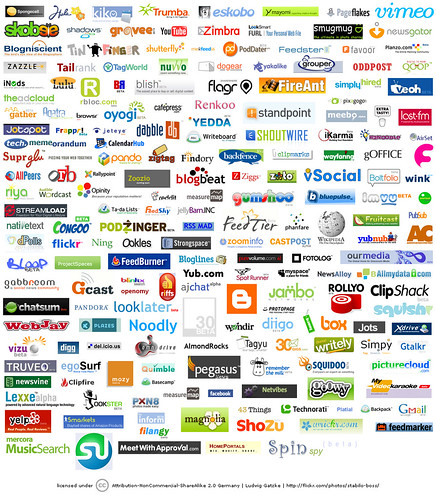 “I don’t necessarily have a problem with that,” states Watkins. “The problem becomes if they start fishing for unflattering or potentially damaging kind of content — pictures or wall posts — sort of deliberately using it to hunt for that kind of content, as opposed to simply trying to make maybe a better informed, insightful admission decision about a student. It is an opportunity to learn about people’s interest, the kinds of things they are engaged in, in terms of community-related issues and social issues. In that sense, it does provide a window into a person’s life, and into a person’s interests that can be a value to an admissions committee.”
“I don’t necessarily have a problem with that,” states Watkins. “The problem becomes if they start fishing for unflattering or potentially damaging kind of content — pictures or wall posts — sort of deliberately using it to hunt for that kind of content, as opposed to simply trying to make maybe a better informed, insightful admission decision about a student. It is an opportunity to learn about people’s interest, the kinds of things they are engaged in, in terms of community-related issues and social issues. In that sense, it does provide a window into a person’s life, and into a person’s interests that can be a value to an admissions committee.”
And as for employers looking, Watkins insists it is now a permanent part of the hiring landscape.
“That’s becoming more and more of a common practice. Graduating students, one of the things that they indicated is that when they went out for interviews for jobs, one of the first thing they were asked is, ‘Are you on MySpace?’ or, ‘Are you on Facebook?’ Their potential employers wanted to get access to their profiles.”
Clearly, when it comes to selecting a new employee businesses want to be certain they are making the right choice. And because of the importance to them in making the right hire, students can expect potential employers to do some digging to see if they turn up anything negative.
Not too surprisingly, Watkins notes that such questions routinely cause a certain amount of panic among the group of students who have failed to consider the importance of their personal brand. In a flurry of activity, they attempt to undo any damage that has been years in the making.
Don’t be one of the foolish ones – carefully think about everything you post online. While it is possible, sometimes, to take down questionable materials prior to the wrong person seeing them, the chance that you will miss something is very high.
And don’t try to convince yourself that decision-makers looking at such profiles is somehow an invasion of privacy. If something should truly be kept private, then don’t post it online.
Flickr photo courtesy of Stabilo Boss.